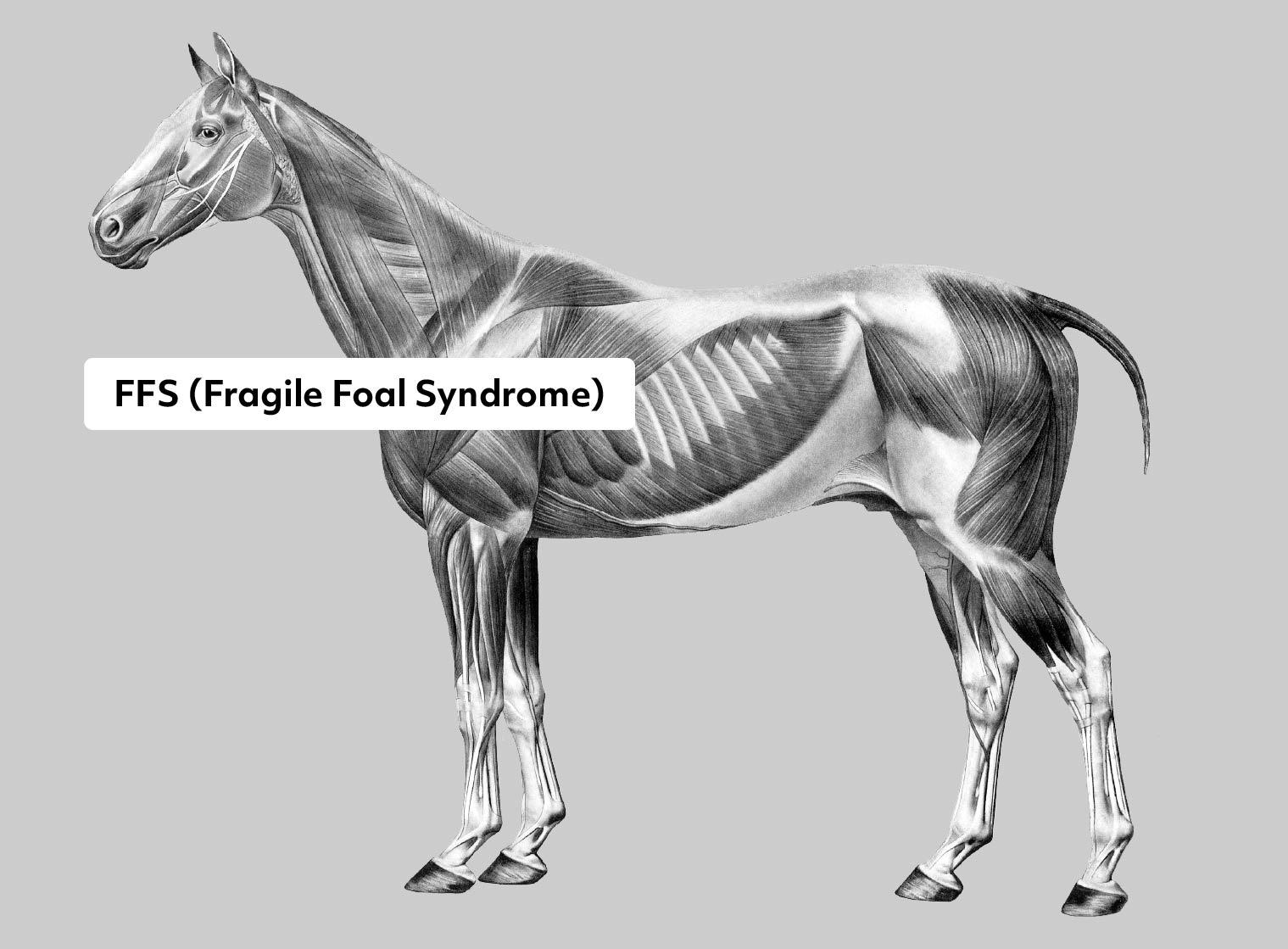"Warmblood" Fragile Foal Syndrome (ffs)
Gene or Region: PLOD1
Reference Variant: C
Mutant Variant: T
Affected Breeds: Warmblood and Other Breeds
Research Confidence: High - Findings reproduced multiple studies
Explanation of Results: ffs/ffs = homozygous for Fragile Foal Syndrome, trait expressed ffs/N = heterozygous for Fragile Foal Syndrome, carrier N/N = no variant detected
Warmblood Fragile Foal Syndrome: Genetic Testing and Health Insights for Horse Breeders
Fragile Foal Syndrome is a connective tissue disorder resulting in joint laxity and extremely thin skin that is only loosely connected to the body. The skin is easily torn, resulting in lacerations, hematomas, and seromas across the foal. Affected foals are euthanized shortly after birth. As Fragile Foal Syndrome is a recessive disorder, horses must inherit two copies (ffs/ffs) to show the disease. Horses with only one allele (ffs/N) are known as carriers due to their ability to produce affected offspring.
Learn more about Warmblood Fragile Foal Syndrome here.
Gene Information
PLOD1 is an enzyme involved in collagen synthesis. Mutations in mice and humans result in similar connective tissue disorders. The mutation observed in horses alters an amino acid, likely disrupting the function of the encoded protein.
References
Kehlbeck, A., Blanco, M., Venner, M., Freise, F., Gunreben, B., & Sieme, H. (2024). Warmblood fragile foal syndrome: Pregnancy loss in Warmblood mares. Equine veterinary journal.
Smythe, M., Dewberry, S., Staiger, E. A., Allen, K., & Brooks, S. (2023). 45 Quantifying gait quality changes in fragile foal syndrome carriers using artificial intelligence. Journal of Equine Veterinary Science, 124, 104347.
¹ Martin, K., Brooks, S., Vierra, M., Lafayette, W. T., McClure, S., Carpenter, M., & Lafayette, C. (2021). Fragile Foal Syndrome (PLOD1 c.2032G>A) occurs across diverse horse populations. Animal Genetics, 52(1), 137-138. https://www.researchgate.net/publication/345638537_Fragile_Foal_Syndrome_PLOD1_c2032GA_occurs_across_diverse_horse_populations
² Rahael, H., Smythe, M., Dewberry, S., Oberdorfer, A., Allen, K., & Brooks, S. (2023). 44 Detecting conformational differences in Fragile Foal Syndrome carriers utilizing artificial intelligence. Journal of Equine Veterinary Science, 124, 104346. https://doi.org/10.1016/j.jevs.2023.104346
³ Smythe, M., Dewberry, S., Staiger, E., Allen, K., & Brooks, S. (2023). 45 Quantifying gait quality changes in fragile foal syndrome carriers using artificial intelligence. Journal of Equine Veterinary Science, 124, 104347. https://doi.org/10.1016/j.jevs.2023.104347
⁴ Bellone, R. R., Ocampo, N. R., Hughes, S. S., Le, V., Arthur, R., Finno, C. J., & T. Penedo, M. C. (2020). Warmblood fragile foal syndrome type 1 mutation (PLOD1 c.2032G>A) is not associated with catastrophic breakdown and has a low allele frequency in the Thoroughbred breed. Equine Veterinary Journal, 52(3), 411-414. https://doi.org/10.1111/evj.13182
Monthoux C et al., “Skin malformations in a neonatal foal tested homozygous positive for Warmblood Fragile Foal Syndrome.” (2015) BMC Vet Res. 11: 12. PMID: 256373371.
More Horse Health
Lordosis
Lordosis (L1, L2, L3, L4), also known as "Swayback", is a curvature or dip in the spine that is often seen in older horses. However, in the American Saddlebred, this condition also affects younger horses. These animals do not appear to experience pain from their condition and are still able to be used under saddle.
Malignant Hyperthermia
Malignant hyperthermia (MH) is a muscle disorder in which anesthesia, stress, or extreme exercise trigger a hyperthermic state. Symptoms include high temperature, increased heart rate, high blood pressure, sweating, acidosis, and muscle rigidity. If symptoms are not immediately resolved, death is likely to occur.
Myosin-Heavy Chain Myopathy
Myosin-Heavy Chain Myopathy (MY; previously "IMM") is a genetic muscle disease found most commonly in stock-type horses that can result in two different presentations, Immune-Mediated Myositis (IMM) and Nonexertional Rhabdomyolysis “tying up,” which are both characterized by muscle damage or loss. Both presentations are associated with the same genetic variant. Horses with MYHM may exhibit one or both presentations at different times in their lives, although some horses carrying the variant might not display any symptoms at all.
Myotonia
Myotonia (MYT) is a rare disorder involving a slowed relaxation of muscles after contraction. The most well-known example of myotonia is “fainting goats,” a breed that is characterized by sudden rigidy and/or falling over when startled. In the single documented horse, this resulted in a protruding third eyelid when excited, as well as problems with muscle stiffness.
